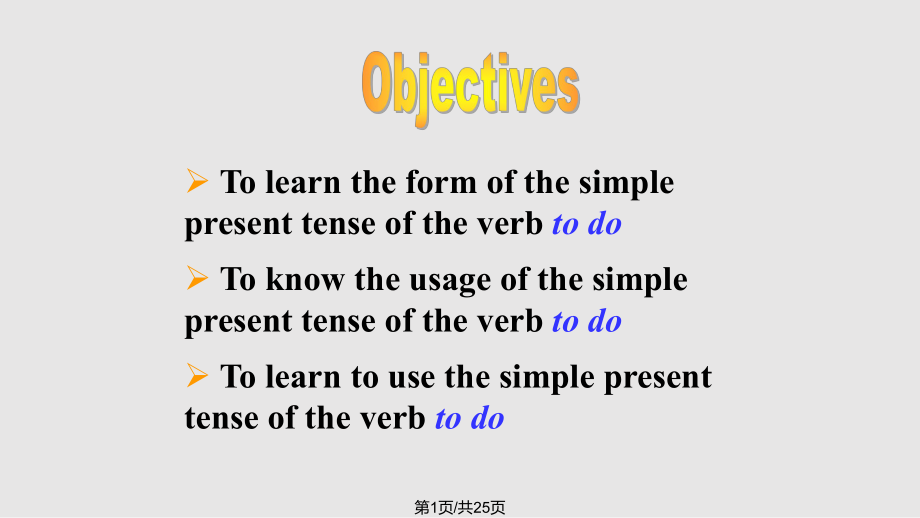《牛津譯林英語(yǔ) 七年級(jí)上A unitLets play sports GrammarPPT課件》由會(huì)員分享���,可在線閱讀��,更多相關(guān)《牛津譯林英語(yǔ) 七年級(jí)上A unitLets play sports GrammarPPT課件(25頁(yè)珍藏版)》請(qǐng)?jiān)谘b配圖網(wǎng)上搜索���。
1、 To learn the form of the simple present tense of the verb to do To know the usage of the simple present tense of the verb to do To learn to use the simple present tense of the verb to do第1頁(yè)/共25頁(yè)語(yǔ)法講解建議采用歸納法��,如盡可能多的呈現(xiàn)一些相關(guān)例句��,或可讓學(xué)生從已學(xué)課文中找相應(yīng)例句�,引導(dǎo)學(xué)生試著從所觀察到的語(yǔ)言現(xiàn)象中總結(jié)出語(yǔ)言規(guī)則和語(yǔ)法規(guī)律。第2頁(yè)/共25頁(yè)回顧回顧動(dòng)詞為動(dòng)詞為“be”時(shí),一般現(xiàn)在時(shí)的構(gòu)
2�、時(shí)�����,一般現(xiàn)在時(shí)的構(gòu)成成:1. 主語(yǔ)為主語(yǔ)為第一人稱單數(shù)第一人稱單數(shù)I時(shí)����,時(shí),be 動(dòng)詞用動(dòng)詞用am.2. 主語(yǔ)為主語(yǔ)為第二人稱第二人稱(you), 第一人稱復(fù)數(shù)第一人稱復(fù)數(shù)(we) 以以及及第三人稱復(fù)數(shù)第三人稱復(fù)數(shù)(they)時(shí)����,時(shí),be 動(dòng)詞用動(dòng)詞用 are.3. 當(dāng)主語(yǔ)為當(dāng)主語(yǔ)為第三人稱單數(shù)第三人稱單數(shù)(he, she, it) 時(shí)��,時(shí)����,be 動(dòng)詞用動(dòng)詞用is. 第3頁(yè)/共25頁(yè)Notice the red words in the sentences:1. I love sports, and I like football very much.2. Li Hua comes from
3、Guangdong.3. He looks strong and plays football very well.4. Many people like him.5. Li Hua plays football every day.6. Li Hua wants to play in the next World Cup.The tense in these sentences is simple present tense of the verb to do第4頁(yè)/共25頁(yè)We use the simple present tense when we talk about:(1) thin
4�、gs that we often do Li Hua plays football every day.(2) things that are always true He comes from Guangdong.(3) things that are true now He now lives in Beijing.第5頁(yè)/共25頁(yè)The simple present tense has these forms.Read them and note that we add s to the verb after he/she/it in positivesentences.I walk.H
5、e walks.We do not walk.She does not walk.Do they walk?Does it walk?The forms of the simple present tense第6頁(yè)/共25頁(yè) Things to remember Some verbs end in -s, -x, -ch or sh. We add es to these verbs, e.g., discusses, mixes, watches, washes. We also add es to verbs like go and do. A few verbs end in y. We
6�、 sometimes change the y to i and add es, eg. studies, hurries.第7頁(yè)/共25頁(yè)一般現(xiàn)在時(shí)的疑問(wèn)句形式及回答:Do I/you/we/they play the guitar?Yes, I/you/we/they do.No, I/you/we/they dont.Does he/she/it play the guitar?Yes, he/she/it does.No, he/she/it doesnt.第8頁(yè)/共25頁(yè)Millie and her classmatesdance go like play watch1. I _ p
7、laying volleyball.2. Kitty _ very much.3. Amy _ swimming every week.4. Simon often _ football with his friends.5. Daniel sometimes _ball games on TV.likedancesgoesplayswatches第9頁(yè)/共25頁(yè)Use the information to complete the questions.1. _ Sandy and Kitty enjoy listening to music? _.2. _ Millie like swimm
8���、ing? _.Do Yes, they do Does No, she doesnt第10頁(yè)/共25頁(yè)3. _ Amy enjoy reading? _.4. _ Simon like walking? _.5. _ Simon and Daniel love drawing? _.Does Yes, she doesDoes No, he doesntDo No, they dont第11頁(yè)/共25頁(yè)Complete Daniel and Simons conversation with the correct forms of the verbs in brackets.Daniel: H
9�����、i, Simon. _ you _ (play) football at weekends?Simon: Of course. I often _ (play) football with my cousins.Do playplay第12頁(yè)/共25頁(yè)Daniel: _ your parents _ (go) with you?Simon: No, they dont. But my dad sometimes _ (watch) our games. Sometimes he _ (read) at home. My mum often _ (shop) at weekends. What
10��、about you, Daniel?Daniel: I often _ (stay) at home. Sometimes I _ (go) swimming with my dad.Do go watchesreadsshopsstaygo第13頁(yè)/共25頁(yè)verbsformsexamplesMost verbs+ sVerbs ending in a consonant + y- y + iesVerbs ending in ch, sh, ss or x+ esSome verbs ending in o+ es第14頁(yè)/共25頁(yè)第15頁(yè)/共25頁(yè)1. What _ you _ ? (w
11���、rite)2. _ your driver _ you to school in your own car? (drive) 3. Who _ you _ phone calls to on the way to school? (make)4. When _ you _ your homework? (finish)Quiz I:用所給詞正確形式填空���。dowriteDoesdrivedomakedofinish第16頁(yè)/共25頁(yè)5. What _ you _ at dinner? (discuss)6. When _ you _ to bed? (go)7. _ you _ Computer
12、 Club after school? (attend)8. _ you _ violin lessons once a week? (have) dodiscussdogoDoattendDohave第17頁(yè)/共25頁(yè)Quiz II. A) 請(qǐng)根據(jù)句意���,用括號(hào)內(nèi)所給單詞的適當(dāng)形式填空���。1. I usually _ (go) to school on foot.2. You _ (be) always my best friend.3. Tom often _ (play) basketball with his classmates after school.4. All these chi
13、ldren _ (come) from Sichuan Pegoareplays第18頁(yè)/共25頁(yè)B) 請(qǐng)根據(jù)漢語(yǔ)句子意思���,完成英語(yǔ)句子���,每空詞數(shù)不限。5. 我不喜歡搖滾音樂(lè)���。I _ rock music.6. 那些男孩子個(gè)子不高��。Those boys _ tall.arent / are notdont like第19頁(yè)/共25頁(yè)7. 瑪麗家離學(xué)校不遠(yuǎn)����。Marys home _ far away from school.8. 他沒(méi)有兄弟姐妹���,是獨(dú)生子���。He _ any sisters or brothers. He is an only child.doesnt have / does no
14、t haveisnt / is not 第20頁(yè)/共25頁(yè)C)請(qǐng)根據(jù)句意��,從括號(hào)中選擇適當(dāng)?shù)膯卧~填空����。9. _ (is, are) Millie and Simon good at English?10. _ (is, are) his hair long and black?11. _ (do, does) your brother _ (do, does) morning exercises every day?12. _ (do, does) you _ (live, lives) close to each other?DoAreIsDoeslivedo第21頁(yè)/共25頁(yè) To preview Integrated skills on Page 25 To think about your activities after school To preview Study skills on Page 27第22頁(yè)/共25頁(yè)1. Review the grammar part again.2. What do you like to do after school? Write them down. Use the simple present tense of the verb to do.第23頁(yè)/共25頁(yè)第24頁(yè)/共25頁(yè)感謝您的觀看!第25頁(yè)/共25頁(yè)
 牛津譯林英語(yǔ) 七年級(jí)上A unitLets play sports GrammarPPT課件
牛津譯林英語(yǔ) 七年級(jí)上A unitLets play sports GrammarPPT課件

